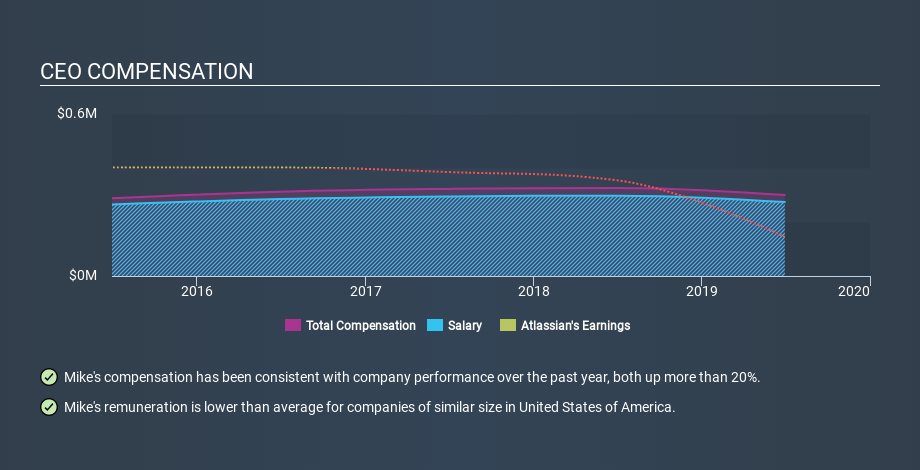Is Atlassian Corporation Plc's (NASDAQ:TEAM) CEO Paid Enough Relative To Peers?

In 2002 Mike Cannon-Brookes was appointed CEO of Atlassian Corporation Plc (NASDAQ:TEAM). This report will, first, examine the CEO compensation levels in comparison to CEO compensation at other big companies. Next, we'll consider growth that the business demonstrates. And finally - as a second measure of performance - we will look at the returns shareholders have received over the last few years. This process should give us an idea about how appropriately the CEO is paid.
Check out our latest analysis for Atlassian
How Does Mike Cannon-Brookes's Compensation Compare With Similar Sized Companies?
According to our data, Atlassian Corporation Plc has a market capitalization of US$32b, and paid its CEO total annual compensation worth US$300k over the year to June 2019. While we always look at total compensation first, we note that the salary component is less, at US$274k. When we examined a group of companies with market caps over US$8.0b, we found that their median CEO total compensation was US$11m. Once you start looking at very large companies, you need to take a broader range, because there simply aren't that many of them.
Most shareholders would consider it a positive that Mike Cannon-Brookes takes less in total compensation than the CEOs of most other large companies, leaving more for shareholders. While this is a good thing, you'll need to understand the business better before you can form an opinion.
You can see a visual representation of the CEO compensation at Atlassian, below.
Is Atlassian Corporation Plc Growing?
Atlassian Corporation Plc has reduced its earnings per share by an average of 91% a year, over the last three years (measured with a line of best fit). In the last year, its revenue is up 37%.
The reduction in earnings per share, over three years, is arguably concerning. But on the other hand, revenue growth is strong, suggesting a brighter future. In conclusion we can't form a strong opinion about business performance yet; but it's one worth watching. It could be important to check this free visual depiction of what analysts expect for the future.
Has Atlassian Corporation Plc Been A Good Investment?
Most shareholders would probably be pleased with Atlassian Corporation Plc for providing a total return of 376% over three years. So they may not be at all concerned if the CEO were to be paid more than is normal for companies around the same size.
In Summary...
It appears that Atlassian Corporation Plc remunerates its CEO below most large companies.
Mike Cannon-Brookes is paid less than what is normal at large companies, and the total shareholder return has been pleasing over the last three years. We would like to see EPS growth, but in our view it seems the CEO is modestly remunerated. CEO compensation is one thing, but it is also interesting to check if the CEO is buying or selling Atlassian (free visualization of insider trades).
Important note: Atlassian may not be the best stock to buy. You might find something better in this list of interesting companies with high ROE and low debt.
If you spot an error that warrants correction, please contact the editor at editorial-team@simplywallst.com. This article by Simply Wall St is general in nature. It does not constitute a recommendation to buy or sell any stock, and does not take account of your objectives, or your financial situation. Simply Wall St has no position in the stocks mentioned.
We aim to bring you long-term focused research analysis driven by fundamental data. Note that our analysis may not factor in the latest price-sensitive company announcements or qualitative material. Thank you for reading.

 Yahoo Finance
Yahoo Finance 
